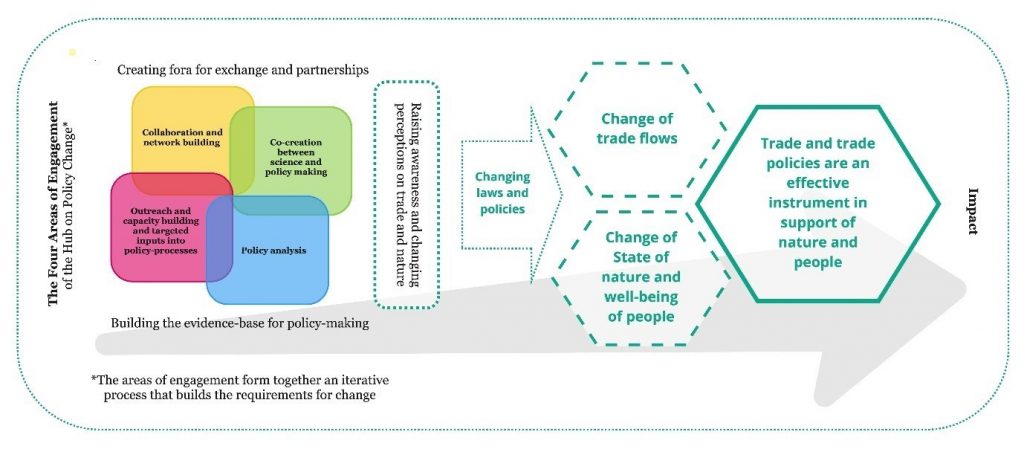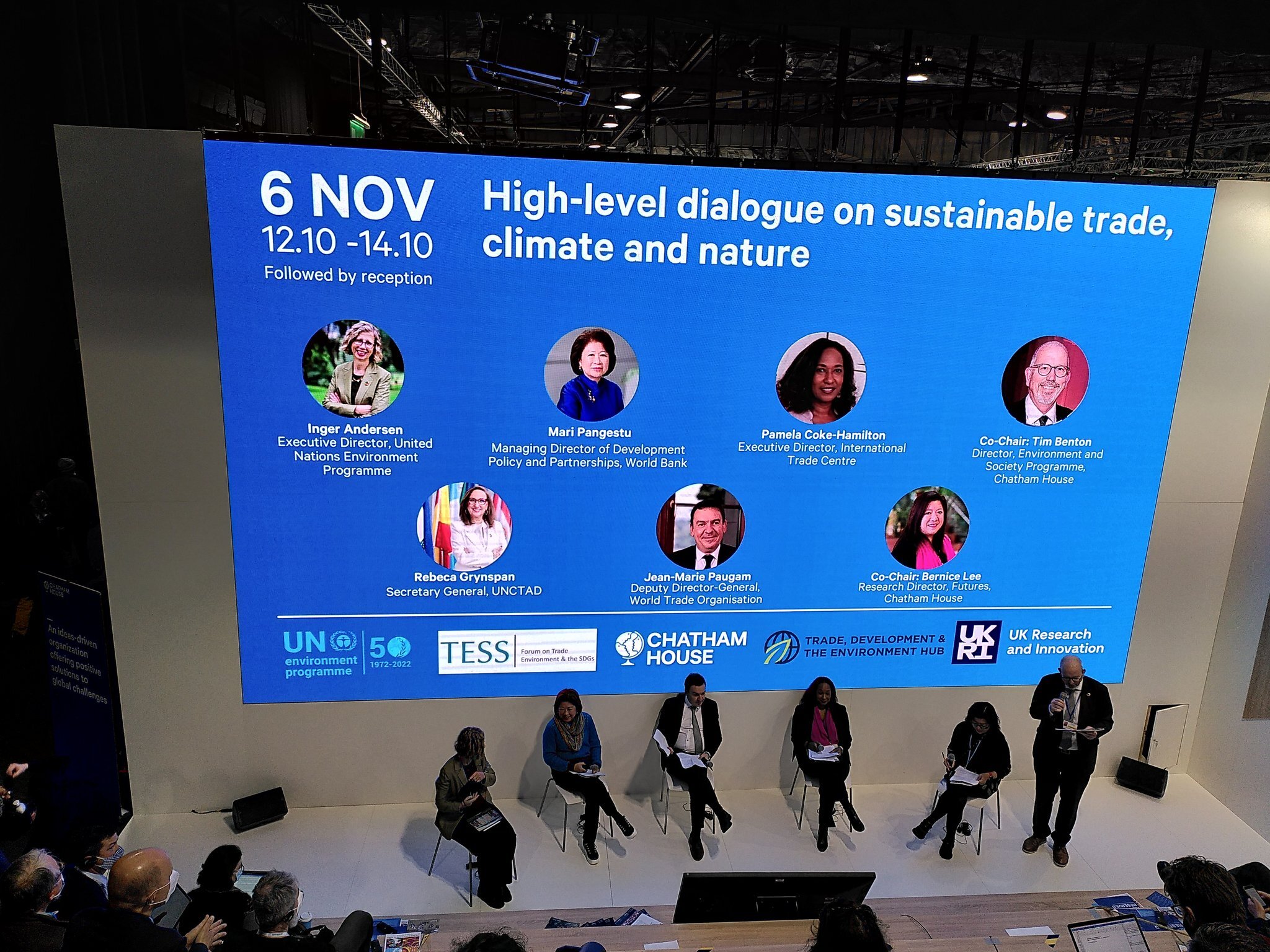Image caption: High-level dialogue at COP26, co-hosted by the GCRF TRADE Hub, on how cooperation on trade can support climate action and sustainable development (held at the Blue Zone of COP26, Glasgow (UK) 2021). The dialogue featured imminent experts on the subject, including heads of the UN Environment Programme (UNEP), UN Conference on Trade and Development (UNCTAD), International Trade Centre (ITC), senior World Bank and World Trade Organization officials, several trade ministers, and leading representatives from International Chamber of Commerce, UNEP-WCMC, and the World Fairtrade Organization (access recording here)
By its nature, international trade connects countries. As such – from a public policy perspective –choices made in exporter countries regarding commodities and wildlife products, will not simply be driven by domestic regulation. Rather, these choices will also be influenced by the policies of consumer countries, third countries involved in supply chains, and by international trade rules and agreements. Therefore, the TRADE Hub’s policy impact workstream – although orientated towards delivering benefits in developing countries – is both international and global.
TRADE Hub’s international role
The TRADE Hub’s work emphasizes efforts to better understand how the policy choices of both producing and consuming countries shape environmental and social outcomes in developing countries, including through the design and implementation of bilateral and regional trade agreements. The TRADE Hub works with the multilateral trading system (via the WTO) and multilateral environmental agreements (such as CITES, CBD and the UNFCCC), which respectively set the overall rule-based framework for international trade and global environmental policy objectives (See our discussion paper here on the advantages and challenges of international trade).
Integrating environmental, social and economic dimensions of sustainability is necessary to advance on the Sustainable Development Goals (SDGs). However, and despite these global policy fora, international diplomacy and policy development on trade remains largely siloed, and there remains a considerable challenge to further integrate these dimensions of sustainability. Here, the TRADE Hub is playing a critical role connecting multisectoral actors and raising awareness of the synergies between agendas (See our latest policy primer on biodiversity and international trade).
The work of the TRADE Hub in connecting different actors involves awareness-raising in both directions e.g., on the importance of natural systems to enable production and therefore stable, resilient trade in commodities and wildlife; and at the same time, highlighting the potential of trade and trade policy to foster environmental sustainability and social prosperity.
There are several routes through which sustainable global trade can support development outcomes. For example:
- by opening new markets and potential price premiums, sustainable trade can help farmers innovate and improve production techniques (generating benefits for farmers and biodiversity);
- with sustainable production and associated well-functioning ecosystems, countries can become more resilient to environmental shocks (which disproportionately impact developing countries);
- by maintaining and enhancing natural assets, supporting the poorest in society who are most directly dependent upon nature for their food security, wellbeing and income.
Promoting understanding of these various connections between nature and trade can help both to bridge divides in understanding between country-specific research groups and contribute to the global consensus on the need to move to a nature-positive economy.
By creating fora for exchange among decision- makers and entities active at the trade-biodiversity nexus, the TRADE Hub encourages interaction between the trade and environment communities, as well as between science and policy. This, in turn, helps identify novel entry points for informed policy making. Insights are channelled back into decision-making processes, via the development and dissemination of knowledge products, targeted outreach, and capacity building activities (see Figure 1.).

Figure 1: Policy Impact Pathway
Highlights so far
TRADE Hub’s initial focus on multilateral policy-making has been on building momentum towards transformative policy change, by supporting alliances around sustainable trade across the international policy arena.
UNEP’s role in the TRADE Hub has enabled engagement at key global events, drawn attention to the trade-biodiversity nexus and fed insights from Hub research into ongoing policy discussions. Examples include a TRADE Hub-hosted discussion during the 2020 Geneva Trade Forum; and Trade Hub’s contribution (as invited experts) to a negotiator-oriented workshop on trade and biodiversity in the context of the post-2020 global biodiversity framework, organised by the United Nations Conference on Trade and Development (UNCTAD) in cooperation with the Secretariat of the CBD in March 2021. TRADE Hub also had a line-up discussing how trade cooperation can support climate action and sustainable development, as part of COP26.
Stimulating interest in the trade-biodiversity nexus in the global policy community has also allowed the TRADE Hub to contribute directly to key policy developments such as the WTO’s draft Ministerial Declaration on and Trade and Environment, and the Launch of Structured Discussions on Trade and Environmental Sustainability by 53 WTO Member States in November 2021, both of which demonstrate a renewed momentum on the integration of environmental issues in the trade sphere. The TRADE Hub is also supporting the Forum on Trade, Environment Sustainability and the Sustainable Development Goals (TESS), launched jointly by UNEP and the Graduate Institute earlier this year. The Forum is facilitating exchange between WTO Members on trade and environment. With biodiversity and climate action as priorities for 2022, the forum has already brought developing country trade negotiators together with UNEP and the International Trade Centre, to discuss capacity needs at the biodiversity-trade nexus as part of a broader long- term consultative process.
The TRADE Hub’s contribution to the Dasgupta Review of the Economics of Biodiversity is another highlight. The direct policy impact of this contribution can be seen in the UK Government Response to the Dasgupta Review, which focused on the need to better understand the impact of free trade agreements on biodiversity, committing to accelerate the transition to sustainable supply chains. As a global review, the Dasgupta Review also having an impact beyond the UK, e.g., Colombia is already using the Review in their National Development Plan. Similarly, through UNEP, TRADE Hub provided input to the G7 Trade Ministers Communique, which also picked up the theme of sustainable supply chains, and the role of trade policy in enabling coordinated action to address the global problems of biodiversity loss and climate change.
What lies ahead for the TRADE Hub?
The TRADE Hub’s policy impact will build on the partnerships and knowledge infrastructure established in the years of its work, including the Hub’s stakeholder policy expert network. The focus of further work will be in ensuring that the potential for biodiversity-trade synergies to deliver sustainable development is embedded in global policy frameworks. The TRADE Hub will actively identify opportunities to realize this potential through the benefits delivered in developing countries.
